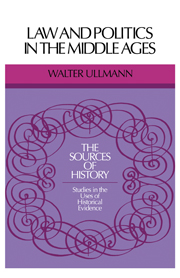Book contents
- Frontmatter
- Contents
- Dedication
- General Editor's Introduction
- Preface
- Abbreviations
- 1 Introduction
- 2 The Roman Law
- 3 The Scholarship of Roman Law
- 4 The Canon Law
- 5 The Scholarship of Canon Law
- 6 Non-Roman Secular Law
- 7 Governmental Doctrines in Literary Sources
- 8 The New Science of Politics
- Select Bibliography
- Index
6 - Non-Roman Secular Law
Published online by Cambridge University Press: 13 November 2009
- Frontmatter
- Contents
- Dedication
- General Editor's Introduction
- Preface
- Abbreviations
- 1 Introduction
- 2 The Roman Law
- 3 The Scholarship of Roman Law
- 4 The Canon Law
- 5 The Scholarship of Canon Law
- 6 Non-Roman Secular Law
- 7 Governmental Doctrines in Literary Sources
- 8 The New Science of Politics
- Select Bibliography
- Index
Summary
Since society was overwhelmingly agrarian, customary law was of great importance throughout the medieval period. By definition customary law was based on mere usages which had been practised for some considerable time. It was therefore the outcome, not of any deliberate exercise of any law-creative will, but of actual concrete actions by a group of persons within regions or localities. The essential and material ingredient of the binding character of customary law was therefore the implicit consent of the populace. The importance of customary law began to decline when more and more topics became the subject of royally (or imperially) enacted written law. Nevertheless, customary law was prevalent and at all times a strong reminder of the binding force which the populace could impart to the law: the efficacy of customary law reflected the ascending theme of government in practice.
The need to reduce customary law to writing was an infallible sign of an advanced state of society which for reasons of legal stability prompted the codification of unwritten, customary law. From the sixth century onwards this indeed was the case among the Germanic tribes and nations, once they had settled down in their surroundings. But even when customary law was committed to writing, it did not thereby change its substance, for the only effect of codification was that the law was more easily ascertainable. There were numerous Germanic codifications, but hardly any of them have been subjected to a rigorous analysis in regard to their constituent and governmental elements. One of the reasons why their study is beset with very great difficulties is linguistic, and in so far their value as sources in the present context is limited.
- Type
- Chapter
- Information
- Law and Politics in Middle Ages , pp. 191 - 224Publisher: Cambridge University PressPrint publication year: 1976



